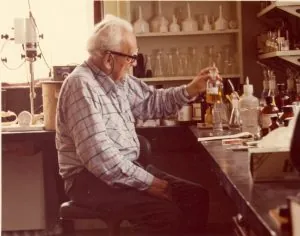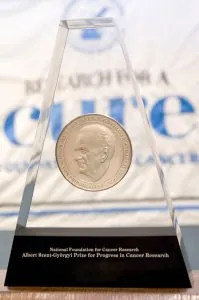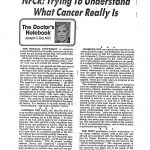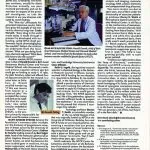The Full Story of Dr. Albert Szent-Györgyi
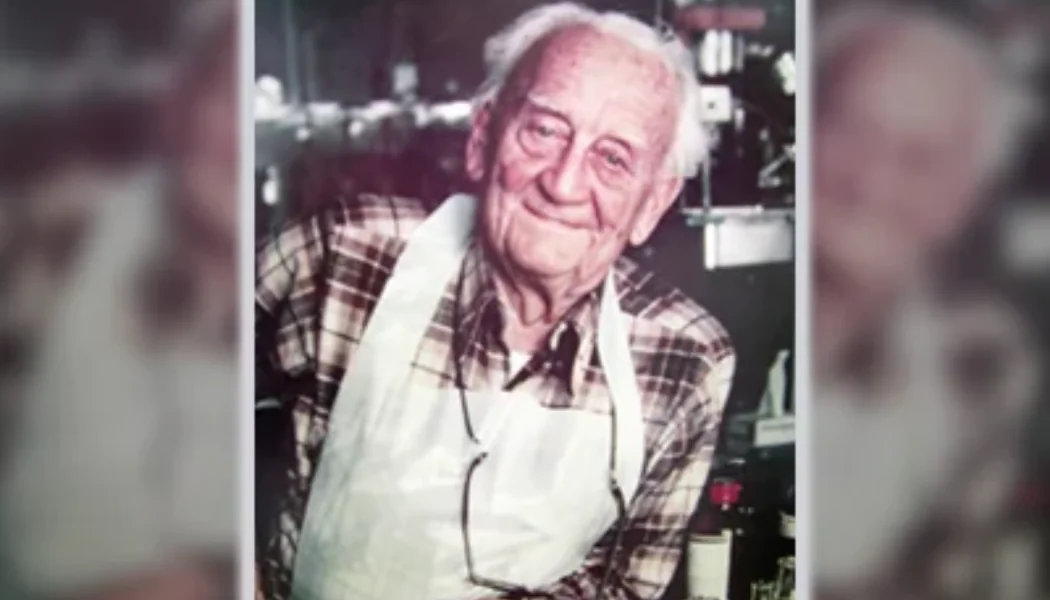
Learn About the Vitamin-C Studying, Nobel-Prize Winning Co-Founder of NFCR
The Europe Years
Born in Budapest, Hungary, on September 16, 1893, Albert Szent-Györgyi’s early life was filled with studying and interrupted by war. Szent-Györgyi was a medical student at the University of Budapest in 1911 and, during his studies, left to fight in World War I. He was awarded the Silver Medal for Valour and was discharged after being wounded in action. He returned to medical school and graduated in 1917 as a doctor of medicine.
In the 1920s and 1930s, he studied, worked, and taught in labs in Prague, Berlin, Leiden, Hamburg, and Cambridge. Dr. Szent-Györgyi’s early research focused on the chemistry of cell respiration.
Dr. Szent-Györgyi was a pioneer. Like many explorers, he challenged the conventional thinking of the day to pursue his novel and promising ideas. In 1937, he won the Nobel Prize for his study of vitamin C and cell respiration.
Coming to America
Dr. Szent-Györgyi was a visiting professor at Harvard University in 1936. Earlier, he conducted research at the Mayo Clinic in Rochester, Minnesota, but he spent years during World War II in Europe. As World War II approached and fascists gained control of the Hungarian government, Dr. Szent-Györgyi helped Jewish friends flee the country. It is alleged that Adolf Hitler personally ordered Dr. Szent-Györgyi’s arrest, and, for part of the war, he was hiding from the Gestapo.
After the war ended, he returned to the University of Budapest to establish a laboratory and was elected to the Hungarian parliament. However, his opposition to the communist influence in Budapest led to his emigration to the United States in 1947, where he founded the Institute for Muscle Research at Woods Hole Marine Laboratory in Massachusetts.
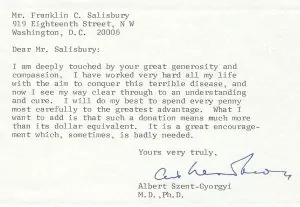
Cancer Research and Accolades
In the late 1950s, Dr. Szent-Györgyi developed a research interest in the biochemistry of cancer. And after meeting Franklin Salisbury in 1973, they co-founded the National Foundation for Cancer Research (NFCR). Since then, NFCR has provided more than $340 million in support of cancer research and prevention education programs.
Dr. Szent-Györgyi was a member of many scientific societies in different countries and received many honors, in addition to the Nobel Prize, including the Cameron Prize of Edinburgh University in 1946 and the Lasker Award in 1954. He wrote ten books, including On Oxidation, Fermentation, Vitamins, Health and Disease (1939), Chemistry of Muscular Contraction (1947), Chemical Physiology of Contraction in Body and Heart Muscle (1953), and Bioenergetics (1957).
Dr. Szent-Györgyi passed away on October 22, 1986, of kidney failure at his home in Massachusetts. Through NFCR, his work continues to help individuals throughout the world.
36 Research Labs
100s of Scientists
MILLIONS of patients
all rely on you for support.
The Szent-Györgyi Prize
NFCR is committed to upholding Dr. Szent-Györgyi’s vision of curing cancer through innovation and collaboration. As part of this commitment, NFCR has established this prize to honor scientists who have made extraordinary progress in cancer research and to focus attention on the essential role of basic research in finding the still elusive answers to the mysteries of cancer.
The Szent-Györgyi Prize serves to stimulate the quest for continued investment in the pioneering research that will produce scientific breakthroughs and lead to a deeper understanding of the scientific concepts behind the genetics and molecular makeup of cancer. By calling attention annually to achievements in this area, it is our desire to heighten awareness of the kind of research and discovery that must be accomplished
before we can hope to produce cancer cures.



